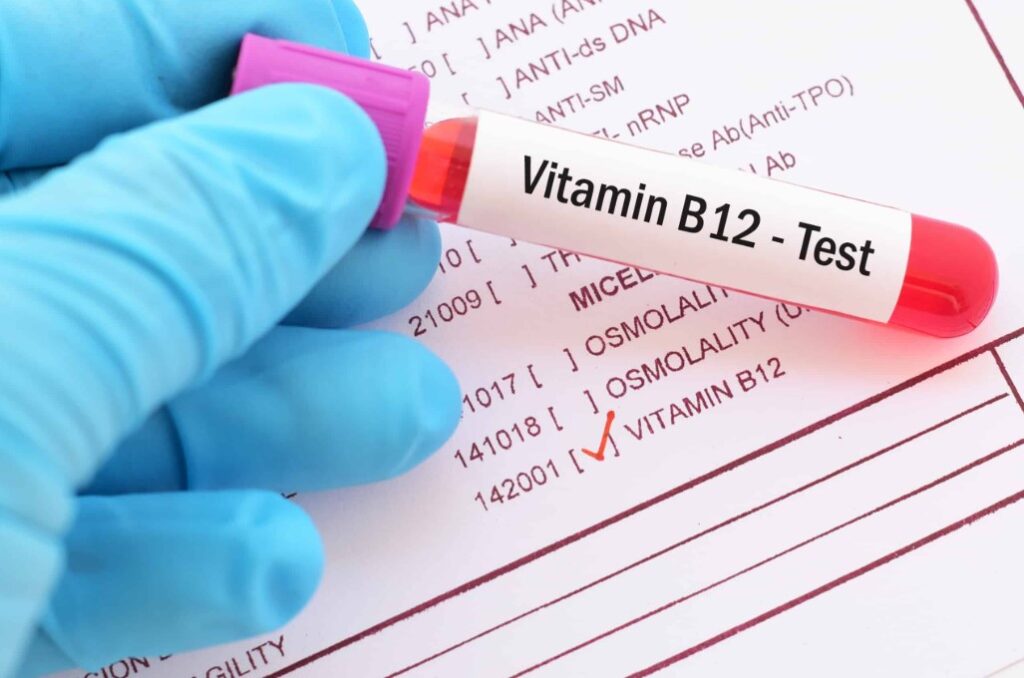
Vitamin B12 is an essential nutrient and helps in the body in any different ways. From supporting energy levels to aiding in the formation of red blood cells and promoting nervous system health.
Deficiencies in B12 can develop slowly, and the signs may be subtle at first. Because the body doesn’t naturally produce B12, it’s important to make sure you’re getting enough through food or supplementation.
Here, we’ll break down some of the most common symptoms of low B12 and how to address them.
Are You Following a Plant-Based Lifestyle? This Could Impact Your B12 Levels

If you follow a plant-based diet, you might already be aware that B12 deficiency is something to watch for. B12 is most often found in animal-based foods such as meat, eggs, and dairy, which means that plant-based lifestyles can often lack sufficient B12 intake. While some plant foods may be fortified with B12, it’s not as easily absorbed as it is from animal sources. For anyone committed to a plant-based diet, ensuring enough B12 is crucial, as a deficiency can lead to low energy, brain fog, and even long-term health concerns.
For those pursuing a plant-based lifestyle, incorporating fortified foods like certain plant milks, cereals, or nutritional yeast can help. However, these sources alone may not always be enough, especially if you have higher B12 needs due to stress or activity levels. Consider adding a reliable B12 supplement if you’re concerned, or discuss your options with a healthcare provider to ensure you’re covering all your nutritional bases.
Feeling Fatigued? B12 Complex Vitamins Might Be the Solution
A noticeable sign of B12 deficiency is fatigue that lingers even after a full night’s rest. This vitamin is critical in helping your body produce red blood cells, which are mostly responsible for transporting oxygen throughout your system. When B12 is low, you may not have enough red blood cells to effectively carry enough oxygen, leading to a lack of energy and persistent tiredness.
This is where B12 complex vitamins come in handy. Quality B12 complex vitamins can help bridge the gap, ensuring your body has the resources to produce red blood cells and support daily energy levels. For those who may struggle with absorbing B12 from food alone, a B12 complex is an easy and reliable way to stay on top of this crucial nutrient.
Experiencing Tingling or Numbness? Your Nerves Could Be Lacking B12

One of the more unique symptoms of low B12 is a tingling sensation in your hands or feet, sometimes described as “pins and needles.” This sensation occurs because B12 is vital for producing myelin, a protective sheath around your nerves that ensures they function properly. Without enough B12, your nerves can start to misfire, resulting in unusual sensations and numbness.
While tingling could have various causes, it’s worth investigating B12 levels if this symptom becomes persistent. Foods like fish, dairy, and eggs contain substantial amounts of B12, which may help prevent or reduce these symptoms. If you’re not consuming these foods regularly, consider a daily supplement to maintain nerve health and avoid long-term issues.
Noticing Pale or Jaundiced Skin? It Could Be a B12 Deficiency
Another sign that your body might be running low on B12 is a pale or slightly yellow skin tone. B12 deficiency can often lead to a condition called megaloblastic anemia. This is where your red blood cells become larger and more fragile. These weaker red blood cells often break down more easily, releasing a yellow pigment called bilirubin, which can cause your skin to look paler or jaundiced.
Eating a B12-rich diet, which includes foods like lean meat, fish, and dairy, can help improve skin color and health. If you’re experiencing paleness alongside other symptoms like fatigue or tingling, a blood test to check your B12 levels can provide more clarity. For some people, a B12 shot or higher-dose supplement may be needed to bring levels back up and improve skin tone.
Feeling Foggy or Forgetful? Low B12 Could Be Affecting Your Brain

Vitamin B12 is essential for cognitive health, which is why deficiency can lead to memory issues, trouble concentrating, and even mood changes. B12 helps in forming neurotransmitters, chemicals that facilitate communication between brain cells. When B12 levels drop, these connections can weaken, leading to “brain fog” or forgetfulness that feels unusual for you.
To support brain function and keep your mind sharp, try to incorporate B12-rich foods into your diet regularly. If you’re vegan or vegetarian, consider a supplement that includes B12 to prevent cognitive symptoms. For those who are prone to low levels due to age or certain health conditions, adding a B12 supplement might just make the difference for mental clarity and focus.








